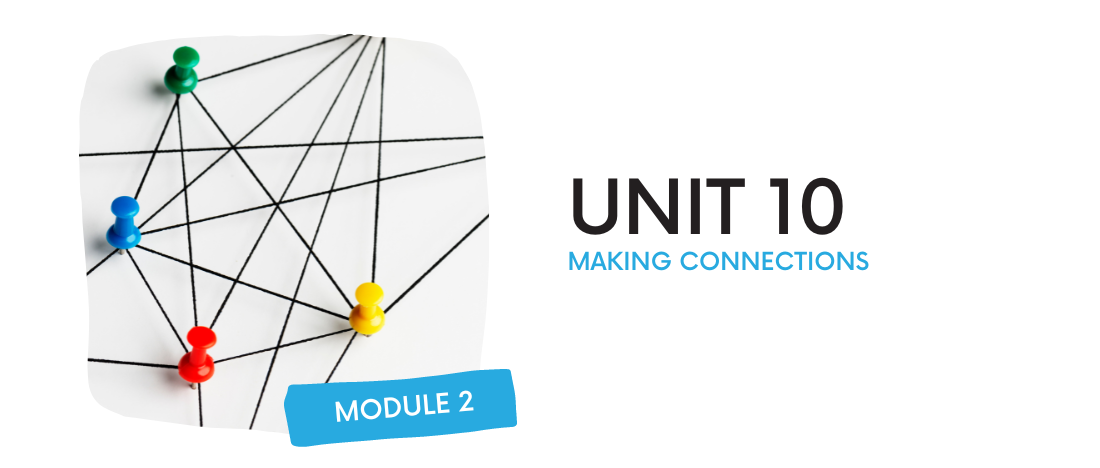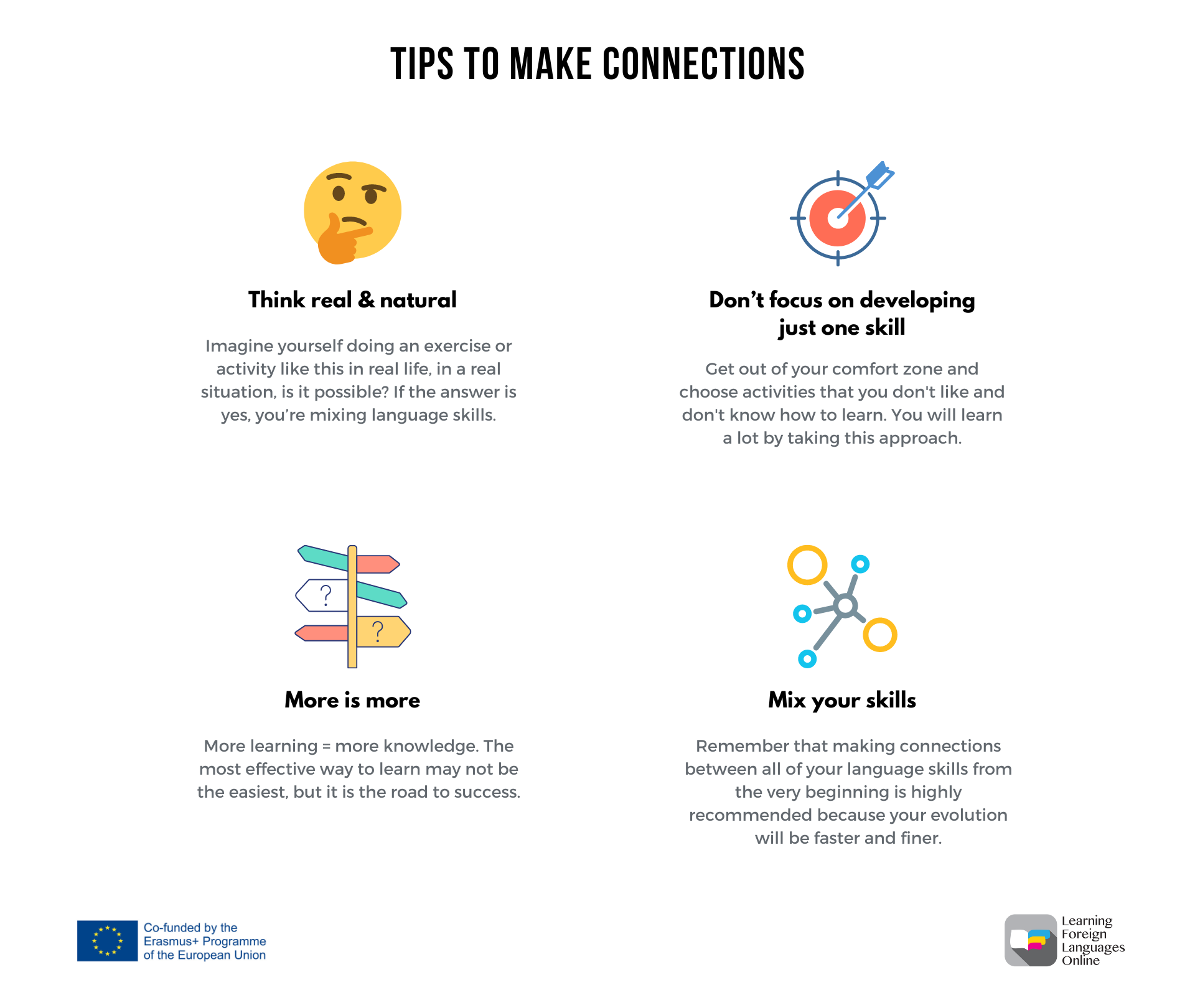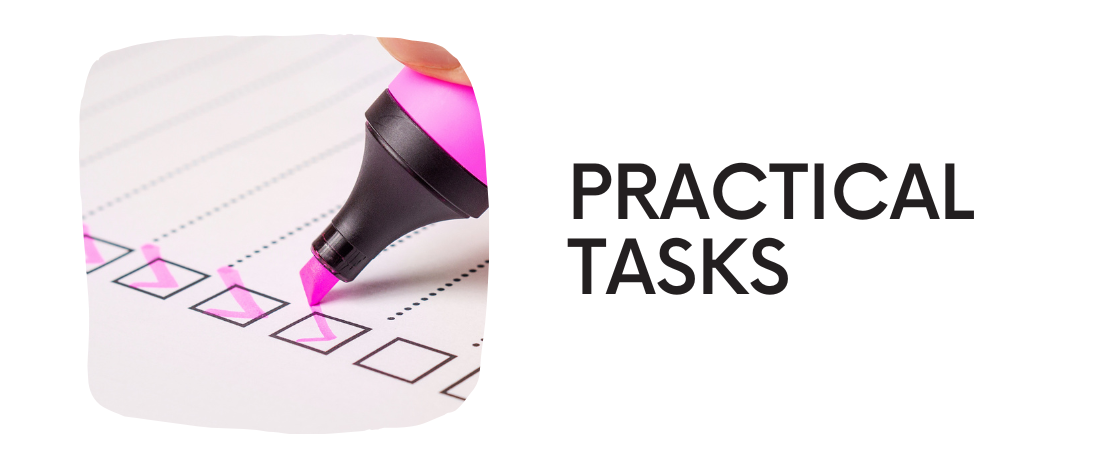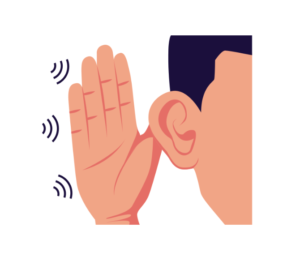
E-course
Making connections
Module 2 | Unit 10
Introduction

In the previous units, we have already seen reading, writing, listening, and speaking one by one. In this unit, we will see how to put them all together.
Language skills seem to be isolated because most of the time we develop them individually, but this is only when we learn. In daily life there are lots of situations where the skills are put together: imagine that you receive a phone call from a foreign client and you have to write down some notes, or in the street you read the opening hours of an already closed store and ask a passer-by where the nearest store is. The real situations show that in daily life the four language skills work together.
Getting started

Tips

Reading, writing, listening, and speaking are not isolated skills. When we talk to a native speaker, we’re developing both speaking and listening. When we practice two skills at one time, they help each other. Have you ever realized that when in a conversation you listen to new words and grammar you use it afterwards?
Practicing two or more skills at once is much more similar to real life. You can follow the next tips to make connections and mix more than one language skill at one time.
Think real & natural
When you’re doing language exercises or activities, if you want to mix different skills, think if your activity or exercise is real and natural. Imagine yourself doing an exercise or activity like this in real life, in a real situation, is it possible? If the answer is yes, you’re mixing language skills.
Don’t focus on developing just one skill
Learners usually like one skill more than others and it is usually the one they feel they are good at, or they enjoy practicing. Frequently, this is the one skill they are good at in their own, native language. But, just like in any communication, it is necessary to be good at and practice more than one skill. So, don’t just focus on one skill. You should put yourself out of your comfort zone or security zone and develop them equally. It might be a good idea to practice one that you like the most along with the one you dislike making the learning process more enjoyable. For example, if writing is your favourite skills, but listening isn’t, you could listen to a song in the foreign language and try to write down the lyrics. This way you will be practicing both skills simultaneously.
More is more
More is always more. If you’re doing an activity that involves reading, writing, listening, don’t feel overwhelmed! This activity deserves attention! It might help you to improve your new language skills at once greatly. If you think about it, children practice several skills at the same time while learning a foreign language. They listen, they sing, they move – all at the same time. They speak, they act, they write – at the same time. The most effective way to learn may not be the easiest, but it is the road to success.
Possible and simple mixing activities
Listening and Reading
Take an easy text and its transcription. Read it many times, afterwards read and listen to it at the same time. It will help you to improve your listening and reading. Check out the links that contain many examples of audio lessons and their transcripts.
Listening and Writing
You will find several resources which you can listen to and write. The best way to put listening and writing together is dictation. Dictation is also good for orthography.
Speaking and Listening
One simple activity that you can do to connect listening and speaking is to listen to a short text and then repeat it out loud. Listen to it and speak it out loud so many times as you need. This activity is easy and simple, and it will contribute to improving your pronunciation in a foreign language.
Writing and Reading
Another quite simple and easy task to enhance your writing and reading skills is to read a short text, story, or paragraph in your target language that you understand, immediately write some parts or sentences that you can still remember. Do it time after time and it becomes better. Memory is an important part of the process of learning a language, you must train it as much as possible. This activity is a good way to start off.
Last tip
As you see, mixing skills is not difficult at all; quite the opposite, it’s very natural and easy. These pretty simple activities make connections between all of them. Also, they will help you to improve your language skills quickly. Remember that making connections between all of your language skills from the very beginning is highly recommended because your evolution will be faster and finer.

More resources

- How to Improve Foreign Language Skills: 20 Secrets to Find Balance and Build Fluency
- 9 Ideas to Integrate Language Learning Into Your Everyday Life
- Don’t lose your language skills! How to retain a foreign language
- 8 Ways to Train Your Mind for Successful Language Learning
- Tips and Advice to Improve your Language Skills
Practical tasks

 Create a schedule for 3 days where the first day you practice just one language skill; the second, another different skill and the third day you put them together. Organize this schedule in order that you can practice the four different language skills.
Create a schedule for 3 days where the first day you practice just one language skill; the second, another different skill and the third day you put them together. Organize this schedule in order that you can practice the four different language skills.
 Think of a daily conversation in the restaurant, in the coffee shop or whenever, try to write it down in your language, then translate it into your target language. Afterwards, try to memorize and perform it in front of the mirror.
Think of a daily conversation in the restaurant, in the coffee shop or whenever, try to write it down in your language, then translate it into your target language. Afterwards, try to memorize and perform it in front of the mirror.
 Choose a difficult sound in your target language, listen to a short recording and note down the words in which it appears during the recording. This exercise will help you to improve both listening and writing.
Choose a difficult sound in your target language, listen to a short recording and note down the words in which it appears during the recording. This exercise will help you to improve both listening and writing.
 Search for Speechnotes.co and choose your target language. Read a text loudly, check the program types automatically when you are reading, then compare the text you have read with what the program wrote. This task is useful to enhance your reading and pronunciation.
Search for Speechnotes.co and choose your target language. Read a text loudly, check the program types automatically when you are reading, then compare the text you have read with what the program wrote. This task is useful to enhance your reading and pronunciation.
 PLAY A GAME of TIC TAC TOE
PLAY A GAME of TIC TAC TOE
Play a game! We suggest you find a partner and play tic-tac-toe. Draw a grid with nine spaces and assign each space a topic of conversation. Make sure you know some vocabulary related to these topics so it’s best to keep them general, if you are confident you can adjust the topics to your interests. We suggest topics like cars, colors, pets, jobs, danger, holidays, home, family, summer, food, etc. First take 30 seconds to write down as many words related to this topics as you can think of. Each of you has to talk about a topic for a minute. If you can talk about it without making long pauses you can put an X or an 0 in the space. After you get comfortable playing the game you can talk for a longer amount of time. This is a fun and engaging way to encourage practicing several skills at the same time – writing, listening and speaking.
Unit test

